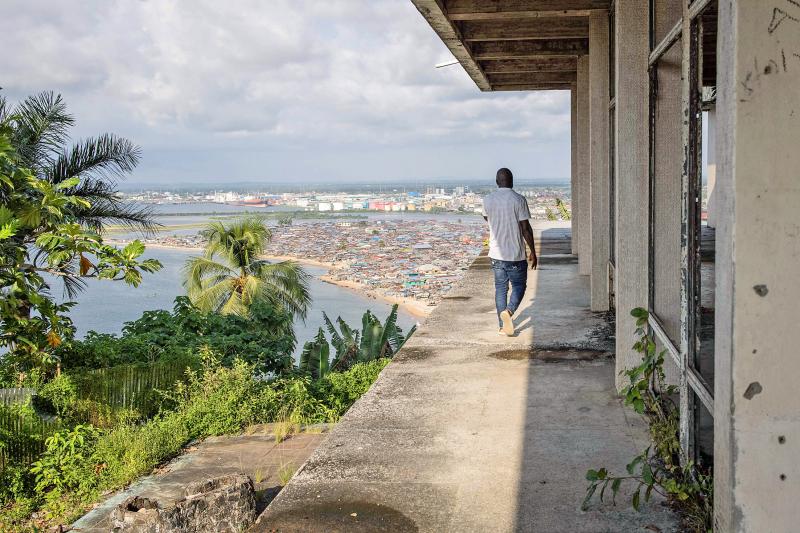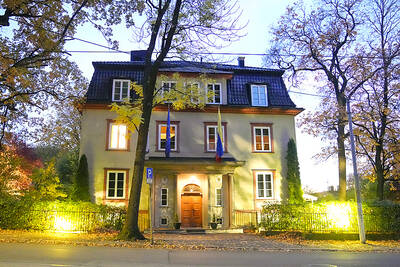Towering above Liberia’s ramshackle capital, Monrovia, stands a hotel that once symbolized an African dream, yet today lies in ruins, a legacy of brutal conflict.
When it opened its doors in 1960, the Ducor was one of the few five-star hotels in Africa, boasting a night club and air-conditioned rooms, according to travel guides.
At its height, it hosted VIPs such as former Ethiopian emperor Haile Selassie. Guests would lounge by the swimming pool, sipping cocktails and watching the sun set over the Atlantic.

Photo: AFP
However, the Ducor shut in 1989 at the outbreak of back-to-back civil wars that ran from 1989 to 1997 and from 1999 to 2003, and swiftly fell into disrepair.
Today, little of Monrovia bears the visible marks of war, but the Ducor’s decaying hulk stands as a reminder of the conflict that killed more than 250,000 people. The hotel lies in limbo, and even who owns it seems unclear.
The ruin, atop one of the city’s highest hills, looms over Monrovia’s downtown and the densely populated West Point slum. The former hotel’s rooms have been stripped bare, mildewed walls are pockmarked with bullet and shell holes, and the grounds have become a haunt for drug users.
“It makes everybody sad,” said Ambrose Yebea, a retired Liberian Ministry of Information, Cultural Affairs and Tourism official who previously offered tours of the hotel.
The Liberian government once planned to restore the hotel to its former glory with the help of former Libyan leader Muammar Qaddafi, but there has been no progress since his downfall in 2011 — and time continues to chip away at the Ducor.
There were few hotels in Monrovia in the 1950s, Yebea said, prompting the construction of the Ducor in 1960 to cater to traveling executives and government officials.
Designed by Israeli architect Moshe Mayer, in modernist style, it became one of Africa’s most luxurious hotels. Then-Israeli minister of foreign affairs Golda Meir, who later became prime minister, attended the opening ceremony.
Later, squatters occupied the site, but then-Liberian president Ellen Johnson Sirleaf, who won office in the country’s first post-war election, evicted them in 2007. She then launched renovation plans. In 2011, her government handed the Ducor to the Libyan African Investment Company (LAICO), a subsidiary of Libya’s sovereign wealth fund.
According to a 2011 government statement, the renovated hotel was due to have 151 rooms, restaurants, a shopping center, a tennis court and a casino — as well as provide jobs in the impoverished country.
However, the project — which with another scheme to develop a rubber-processing plant was priced at US$65 million — fell afoul of another war.
Liberia cut ties with Qaddafi’s Libya in 2011 as the country descended into civil war. Renovation works stopped.
“It came to us as a big shock,” said Frank Williams, a laborer who said he had been one of 150 people employed by LAICO. “Today we are jobless.”
Since then, the project has been at a standstill, and its future is unclear.
Neither the Liberian presidential office, its tourism ministry or LAICO responded to several requests for information.
The Libyan entity is under EU sanctions over its alleged close links to the former Qaddafi regime. In 2020, the UN Security Council also said that LAICO is struggling financially, incurring debts for the hotels under its management.
Some still hope to see the Ducor reborn.
Yebea said it could lure tourists and generate jobs.
“Every Liberian sees it the same way,” he said. “They want it to be refurbished.”

STEPPING UP: Diminished US polar science presence mean opportunities for the UK and other countries, although China or Russia might also fill that gap, a researcher said The UK’s flagship polar research vessel is to head to Antarctica next week to help advance dozens of climate change-linked science projects, as Western nations spearhead studies there while the US withdraws. The RRS Sir David Attenborough, a state-of-the-art ship named after the renowned British naturalist, would aid research on everything from “hunting underwater tsunamis” to tracking glacier melt and whale populations. Operated by the British Antarctic Survey (BAS), the country’s polar research institute, the 15,000-tonne icebreaker — boasting a helipad, and various laboratories and gadgetry — is pivotal to the UK’s efforts to assess climate change’s impact there. “The saying goes

Police in China detained dozens of pastors of one of its largest underground churches over the weekend, a church spokesperson and relatives said, in the biggest crackdown on Christians since 2018. The detentions, which come amid renewed China-US tensions after Beijing dramatically expanded rare earth export controls last week, drew condemnation from US Secretary of State Marco Rubio, who on Sunday called for the immediate release of the pastors. Pastor Jin Mingri (金明日), founder of Zion Church, an unofficial “house church” not sanctioned by the Chinese government, was detained at his home in the southern city of Beihai on Friday evening, said

Floods on Sunday trapped people in vehicles and homes in Spain as torrential rain drenched the northeastern Catalonia region, a day after downpours unleashed travel chaos on the Mediterranean island of Ibiza. Local media shared videos of roaring torrents of brown water tearing through streets and submerging vehicles. National weather agency AEMET decreed the highest red alert in the province of Tarragona, warning of 180mm of rain in 12 hours in the Ebro River delta. Catalan fire service spokesman Oriol Corbella told reporters people had been caught by surprise, with people trapped “inside vehicles, in buildings, on ground floors.” Santa Barbara Mayor Josep Lluis

The Venezuelan government on Monday said that it would close its embassies in Norway and Australia, and open new ones in Burkina Faso and Zimbabwe in a restructuring of its foreign service, after weeks of growing tensions with the US. The closures are part of the “strategic reassignation of resources,” Venezueland President Nicolas Maduro’s government said in a statement, adding that consular services to Venezuelans in Norway and Australia would be provided by diplomatic missions, with details to be shared in the coming days. The Norwegian Ministry of Foreign Affairs said that it had received notice of the embassy closure, but no